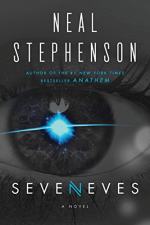|
This section contains 1,389 words (approx. 4 pages at 400 words per page) |

|
His name was forgotten. By the time he had gotten his phone out of his pocket, his crater no longer existed. Nor did the moon.
-- Narrator
(1: The Age of the One Moon paragraph 3)
Importance: A Utah amateur astronomer observes a dusty patch near the moon's equator, and believes he has witnessed a meteor-strike. His first thought is to capture the moment by blogging about it. This quote displays how deeply Internet culture has absorbed civilization, where real-time events are filtered by technology and only secondarily by thought and emotion.
...one of them could zip through space invisibly and punch all the way through a planet and out the other side. There used to be a theory that the Tunguska event was caused by one, but it's been disproved.
-- Konrad Barth, German astronomer
(2: The Seven Sisters paragraph 40)
Importance: Barth—a brilliant astronomer—theorizes a "primordial singularity" (small black hole) might have caused the moon's disintegration. His mentioning of the 1908 Tunguska explosion, where roughly 800 square miles of forest were devastated...
|
This section contains 1,389 words (approx. 4 pages at 400 words per page) |

|



